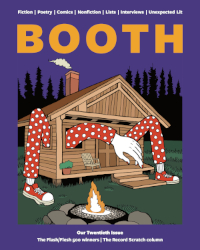An Essay by Robert Rebein
A canter is a cure for every evil. –Benjamin Disraeli
The worst month of my life was spent in an unairconditioned hotel room in Kairouan, Tunisia, September 1989. I had no friends and no money, an unfinished Master’s thesis hanging over my head, and a case of dysentery so bad I might have died had the hotel staff not forced me to drink cup after cup of salted rice water. Throughout my weeks-long illness, I could hear the sounds of horse-drawn carts echoing in the cobblestone streets just beneath my window. Clippity clop, clippity clop, clippity clop . . . Sometimes, when a cart was parked directly in front of the hotel, I could hear the horse snort or shift in its traces. These sounds, so otherworldly and yet so familiar, never failed to comfort me. Gradually the desire to get well again got mixed up in my mind with the need to stroke the withers of these animals which I could hear but not see. The horses, I would murmur in my delirium, I’ve got to get down to the horses . . . Entire days were spent in this hallucinatory state.
When finally I recovered enough to leave the hotel, I descended the stairs on wobbly legs and stood in the intense sunlight of the Place des Martyrs, waiting for one of my phantom horses to appear. At last one did, staggering to the curb before a two-wheeled cart loaded with onions. The animal was little more than skin and bones, its rump covered in open wounds from where the driver, a boy of twelve or thirteen, had whacked it with a length of splintered wood. Ignoring the driver’s shouts to keep my distance, I stepped into the street and rubbed the poor animal along its neck and ears, understanding for the first time how it was that Nietzsche was driven to insanity by the sight of a horse being beaten on a public street.
“Les cheveaux sont . . . la plus noble des creatures,” I scolded the boy in halting French. “This one deserves far better treatment than he’s getting from you.”
“He’s old,” the boy replied, shrugging.
“If I give you money,” I asked, “will you feed him a little grain tonight?”
“His teeth are very bad,” the boy answered, holding out his hand. “But give me the money anyway, and I’ll try.”
Digging in my pocket, I came up with a five dinar note, the last of the money I had changed after arriving in Tunis from London. “Here, take it,” I said, “ and remember …”
“La plus noble, oui,” the boy said. “I know, I know . . .”
Days to come, as my strength returned and I took on a full teaching schedule at a university in the suburbs, I made sure to bring a carrot or potato with me whenever I passed through the Place des Martyrs. Before long all of the cart drivers knew me. “Here he comes!” they would shout. “The crazy English who feeds the horses!"
They meant the name derisively, but that’s not the way I took it. As far as I was concerned, those run-down horses they beat so mercilessly had all but saved my life.



